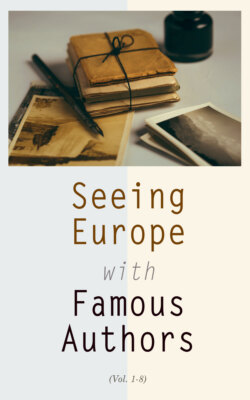Читать книгу Seeing Europe with Famous Authors (Vol. 1-8) - Гарриет Бичер-Стоу - Страница 80
На сайте Литреса книга снята с продажи.
THROUGH THE CALEDONIA CANAL TO INVERNESS1 By Hippolyte Adolphe Taine
ОглавлениеTable of Contents
In the luminous morning mist, amid a line of masts and rigging, the steamboat sailed down the Clyde to the sea. We proceeded along the indented and rugged coast from one bay to another. These bays, being almost entirely closed in, resemble lakes, and the large sheets of water mirror an amphitheater of green hills. All the corners and windings of the shore are strewn with white villas; the water is crowded with ships; a height was pointed out to me whence three hundred sail may often be counted at a time; a three-decker floats in the distance like a swan among sea-mews. This vast space spread forth and full of life, dilates the mind, one's chest expands more freely, one joyfully inhales the fresh and keen breeze. But the effect upon the nerves and the heart does not resemble that of the Mediterranean; this air and country, instead of pre-disposing to pleasure, dispose to action.
We enter a small vessel drawn by three horses, which transports us along the Crinan canal, between two banks of green turf. On the one side are rocks covered with brushwood; on the other, steep declivities of a gray or reddish tinge; this, indeed, is color at least, a pleasure for the eye, well mingled, matched, and blended tints. On the bank and amid the bushes are wild roses, and fragile plants with white tufts smile with a delicate and charming grace.
At the outlet from the canal we go on board a large steamer, and the sea opens out wider than ever. The sky is exceedingly clear and brilliant, and the waves break in the sunlight, quivering with reflections of molten tin. The vessel continues her course, leaving in her track a bubbling and boiling path; sea gulls follow unweariedly behind her. On both sides, islands, rocks, boldly-cut promontories stand in sharp relief in the pale azure; the scene changes every quarter of an hour. But on rounding every point the infinite ocean reappears, mingling its almost flat line with the curve of the white sky.
The sun sets, we pass by Glencoe, and Ben Nevis appears sprinkled with snow; the bay becomes narrower, and the mass of water, confined amid barren mountains, assumes a tragic appearance. Human beings have come hither to little purpose. Nature remains indomitable and wild; one feels oneself upon a planet.
We disembark near Fort William; the dying twilight, the fading red rays on the horizon enable us to get a glimpse of a desolate country; acres of peat-bog, eminences rising from the valley between two ranges of huge mountains. A bird of prey screams amid the stillness. Here and there we see some wretched hovels; I am told that those on the heights are dens without windows, and from which the smoke escapes through a hole in the roof. Many of the old men are blind. What an unpropitious abode for man!
On the morrow we voyaged during four hours on the Caledonian canal amidst solitudes, a monotonous row of treeless mountains, enormous green eminences, dotted here and there with fallen stones. A few sheep of a dwarf breed crop the scanty herbage on the slopes; sometimes the winter is so severe that they die; in the distance we perceive a shaggy ox, with savage eyes, the size of a small ass. Both plants and animals perish, or are stunted. In order to make such a land yield anything it must first be replanted with trees, as has been done in Sutherlandshire; a tree renews the soil; it also shelters crops, flocks and herds, and human beings.
The canal terminates in a series of lakes. Nothing is more noble than their aspect, nothing more touching. The water, embrowned by the peat, forms a vast shining plain, surrounded by a circle of mountains. In proportion as we advance each mountain slowly grows upon us, becomes more conspicuous, stands forth with its form and physiognomy; the farther blue peaks melt the one behind the other, diminishing toward the horizon, which they enclose. Thus they stand in position like an assemblage of huge, mournful beings around the black water wherein they are mirrored, while above them and the lake, from time to time, the sun flashes through the shroud of clouds.
At last the solitude becomes less marked. The mountains are half-wooded at first, and then wholly so; they dwindle down; the widening valleys are covered with harvest; the fresh and green verdure of the herbage which supplies forage begins to clothe the hollows and the slopes. We enter Inverness, and we are surprised to find at almost the extreme north of Scotland, on the border of the Highlands, a pretty and lively modern town. It stretches along the two banks of a clear and rapid river. Many houses are newly-built; we note a church, a castle, an iron bridge. In every part are marks of cleanliness, forethought, and special care. The window-panes shine, the frames have been painted; the bell-handles are of copper; there are flowers in the windows; the poorest nouses are freshly whitewashed. Well-drest ladies and carefully drest gentlemen walk along the streets. Even a desire to possess works of art is shown by Ionian pillars, specimens of pure Gothic, and other architectural gimcrackery, and these prove at least the search after improvement. The land itself is clearly of inferior quality; industry, order, economy and labor have done everything. How great the contrast between all this and the aspect of a small town on the shores of the Mediterranean, so neglected and filthy, where the lower middle class exist like worms in a worm-eaten beam!
1 From "Notes on England." Published by Henry Holt & Co.]
